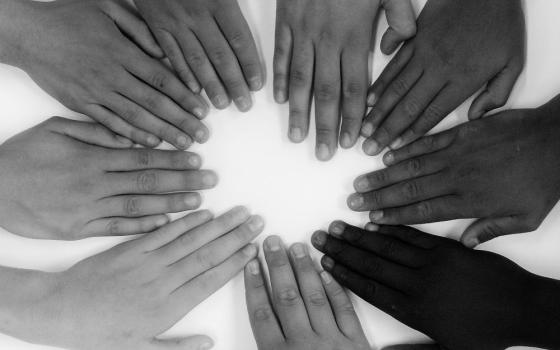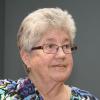As spring slides quickly into summer, I find myself pondering the way many of us white folk begin working on our tans. There is a wide range of ways to give ourselves color for the summer and, if possible, color that will last well into fall or winter.
There's the not-to-be recommended tanning bed, the many versions of tanning lotions, and there is the wonder of "Brother Sun" himself to assist this effort.
Do we not perceive that we are in search for the color of our skin — the very thing which keeps us divided from our companions of true color? We are unconsciously seeking for that which deeply divides us from the neighbor right in our midst. Can we not see this behavior and give it some serious reflection and discussion?
The issue is racism, and it's not just an American problem about black and white; it's about every color in the spectrum in between. We are all created by a loving God and we come in many beautiful shades of black and brown and white.
Our common humanity, our shared histories and our human failings have too long made difference a kind of threat. But today, in our global society, with all of our technology and communication skills, there is no reason for this ignorance to prevail. No matter our race or skin tone, the human heart muscle is the same color in each one of us.
A few years back, I was working in a local parish with a priest from Kerala, in southern India. On the feast of Epiphany, Father Joseph walked over to the manger scene where he gave the final blessing at Mass. He then proceeded to pick up one of the three wise men, the one who was darkest in color. He announced: "I like him the best because he looks the most like me!"
Everyone was caught off guard, but we all enjoyed Father's comment. It's only human to like those who look like us, but we need to expand our horizons a bit and see the range of color God has provided for us.
In the past decade, my religious congregation, along with many others, has been addressing the issue of racism. In brief, we have been trying to uncover the reality of our own personal and communal racism lived out over our religious lives.
We do this in order to change ourselves, to become aware of how we have been complicit in this cultural sin in our nation. We have taken a long look back at the rules and regulations we ourselves put in place, which denied access to people of color — or at least, made it more difficult for them to join us in mission.
We have begun to recognize what a loss this has been for us as individual sisters and for our congregations as a whole. We realize the huge loss for the church as a whole.
As part of our study together, we read an article entitled "Rowing into the Deep." The author is Sr. Patricia Chappell, a Sister of Notre Dame de Namur, currently in leadership at Pax Christi USA.
Sister Patricia's article tells the history of racism in the U.S. and throws light on the patterns and practices which have kept us white people in our "protected status." It lifts up the veil of lies and dishonesty that have maintained our lives as separate and not equal. The article exposes how this has happened in our personal lives and experiences and in the more corporate or systemic and institutional ways.
One of the things Sister Patricia said in her summarizing remarks is a very central truth for people like me and my companions. She asks us to find a way to become "allies" with people of color — not "helpers" or neighbors or some other kind of relationship we might think wonderful.
An ally listens to the other — those suffering from societal racism every day; an ally learns to make the connections about our oppressive ways and our subtle expectations as "whites." The ally learns to see racism as the national disease that it is.
And Sister Patricia urges us all: "While getting sick was not our fault, getting well and healing together is our responsibility." It's about recognizing the innate goodness God provided — ours and that of the other. We must share the challenge of dismantling racism (sin) and of building peace (gift of the Spirit) together.
Learning about ourselves in this way, at our ages, is painful and demanding. I can no longer rely on the good family in which I grew up or my extensive educational opportunities.
I cannot escape the conclusion that I have much interior "homework" to do going forward.
Waking up to new realities and having a changed perspective can bring the grace of new life, a welcome gift of the Spirit, ever present in our search for truth and wholeness.
It's my hope to become a more "colorful" person in the future, in communion with my sisters and brothers of color throughout the world.
[Ellen Dunn is a Dominican Sister of Peace. With degrees in modern languages, religious education and theology, she has been an adjunct faculty member in theology at Ohio Dominican College and Wheeling Jesuit University and has served as a parochial leader and as a member of the leadership team for her congregation. She is a founding member of Spirituality Network.]

